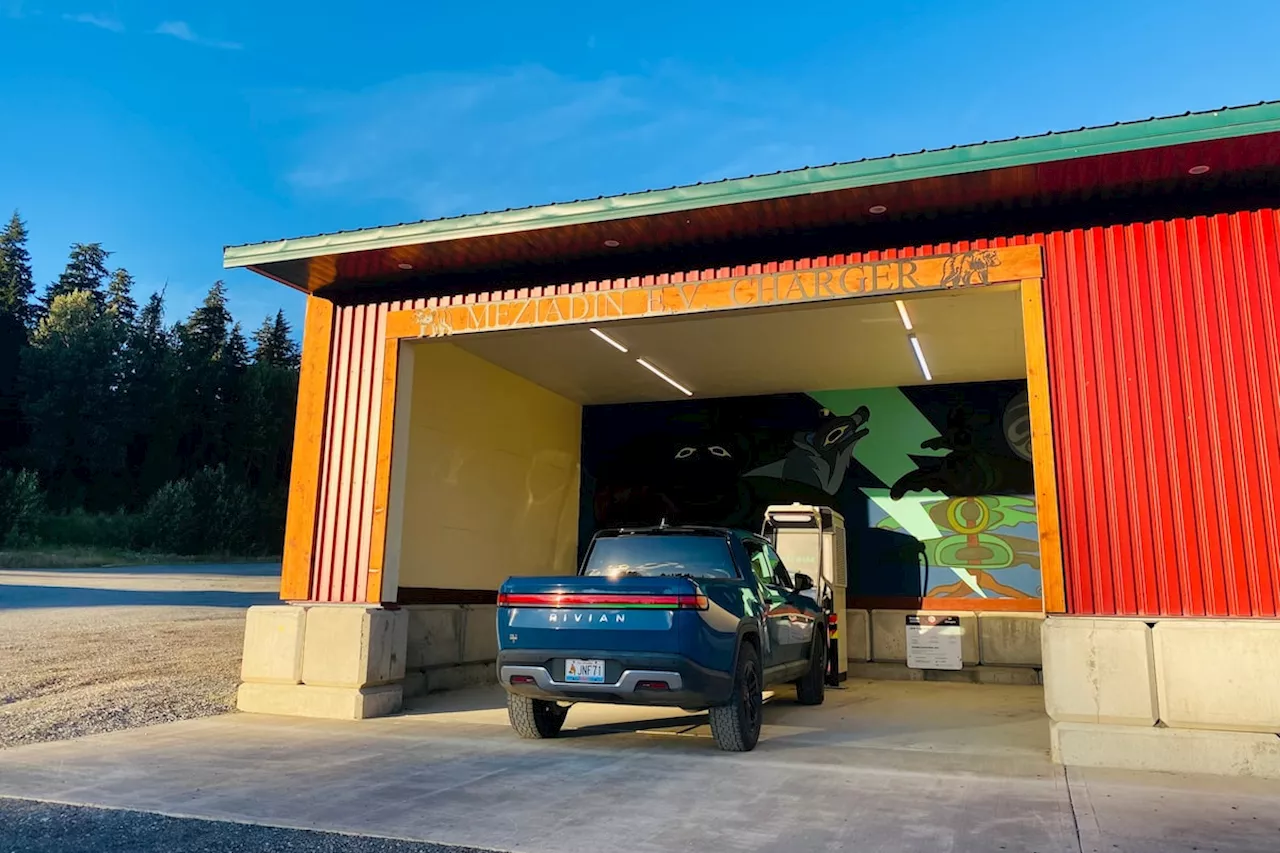This article explores the recent progress in establishing electric vehicle (EV) charging infrastructure in rural British Columbia, highlighting the journey from a challenging experience to a more accessible one for EV drivers. Using a personal anecdote about driving an EV from Vancouver to Whitehorse, the author sheds light on the struggles faced in the past due to the scarcity of chargers, particularly in northern regions. The article then celebrates the significant improvements made in recent years, with strategically placed fast chargers transforming the driving experience. The author emphasizes the collaborative effort of various stakeholders, including First Nations communities, utilities, and governments, in bridging the charging gap and making EV travel more feasible in remote areas.
Jamella Hagen's partner's Rivian charging at Meziadin. The roof keeps snow from falling on the car and on the far wall is a mural painted by local Gitxsan artist Michelle Stoney.The First Nations community of Iskut is nestled below a mountain bowl with a glacier that glints in the sun on clear days. For travellers, it’s a natural stopping point on Highway 37, in the northern part of British Columbia , about 300 kilometres south of the Yukon border.
The Kluachon Store in Iskut has a cozy café that serves meals to locals and travellers alike on this isolated stretch of highway. My boyfriend and I were just passing through. But unlike most of the drivers who were fuelling up and grabbing a snack one day last summer, we were passing through in an Rivian. As we ate egg sandwiches, retired locals and construction workers asked where we were headed, which led to questions about the EV pickup we’d parked at the new charging station outside the café: How far can it go on a charge? Does it work in the winter? Can you drive an EV to Whitehorse from here (a distance of about 730 kilometres)? A year before, we’d had the same questions. When we first drove the EV home to Whitehorse from Vancouver in August of 2023, it was a challenge. We drove through southern B.C. relatively quickly, but then we discovered the incredible slowness and scarcity of chargers in northern B.C. at that time. When a wildfire closed Highway 37 through Iskut, we had to chart a course up the longer Alaska Highway, which also runs from northern British Columbia to the Yukon and then onward to Alaska. We charged in Prince George (3.5 hours at 50 kilowatts), McLeod Lake (about an hour to top up at 25 kilowatts in a dark, empty parking lot), Fort St. John (three hours at 50 kilowatts), and Fort Nelson (22 hours at seven kilowatts). After Fort Nelson, we had 505 kilometres of range and 513 kilometres to travel to the next 50-kilowatt charger, so we crawled through the range-eating inclines of the northern Rockies at 80 kilometres an hour and just made it to the Watson Lake charger (three hours at 50 kilowatts). The lowest output for Level 3 fast charging is around 50 kilowatts. Now on our second trip with the EV in July of 2024, we found the journey completely transformed for EV drivers. There were fast chargers well spaced along the entire route, and no nail-biting “are we going to make it?” moments. Even more chargers have been installed on these routes since our trip, and by this spring there will be a new EV driving corridor to and from the north – enough chargers to make the trip easy in summer and doable in winter with careful planning. The neighbouring jurisdictions of British Columbia and Yukon are both in the top three for EV adoption (along with Quebec), but until now it was a logistical challenge to drive from one to the other. Even though about one in 10 new cars sold in Yukon is a zero-emissions vehicle, according to the Yukon government, a big part of the reason are the sheer distances involved. Prince George is often called B.C.’s northern capital, but if you were to draw a horizontal line across the middle of the province, the city of 76,000 would actually be south of that line. The distance from Price George to Whitehorse is more than 1,600 kilometres, a few hundred kilometres shy of driving from Toronto to Halifax. Between Prince George and Whitehorse, there are few people and even fewer places to fuel. The two highways that span this stretch both wind through forests of gradually diminishing trees, past mountain ranges, lakes, rivers, waterfalls and wildlife. I once counted 33 black bears on Highway 37, while the Alaska Highway has a herd of bison that graze the shoulders most of the year. Caribou, moose, deer, foxes, porcupines and eagles are common. But for most of the drive, there are no settlements or even buildings beside the roads. Signs that direct drivers to the next fuel stop read in the hundreds of kilometres. When we think about the EV transition, stretches like this, where there is often no cellphone reception, provide some of the biggest challenges to public charging. Yet, this area is becoming an early model for how to provide rural EV infrastructure. Certainly, it has been a collective effort. First Nations, utilities, provincial, territorial and federal governments, and private businesses have all contributed. The first two communities to bridge the northern charging gap were Iskut and Meziadin Junction on Highway 37. In both cases, the local First Nation saw an opportunity they felt was good for their communities and for drivers. Previously, there was a 786-kilometre gap between EV chargers from New Hazelton to Watson Lake that stretched the entire length of Highway 37. When Meziadin Junction, 200 kilometres from the south end, and then Iskut, 284 kilometres farther north, installed chargers, the remaining gap was only 339 kilometres, well within the range of most newer long-range EVs in warm weather
Sustainability Transportation Electric Vehicles EV Charging Rural Infrastructure British Columbia Yukon Sustainable Transportation
Canada Latest News, Canada Headlines
Similar News:You can also read news stories similar to this one that we have collected from other news sources.
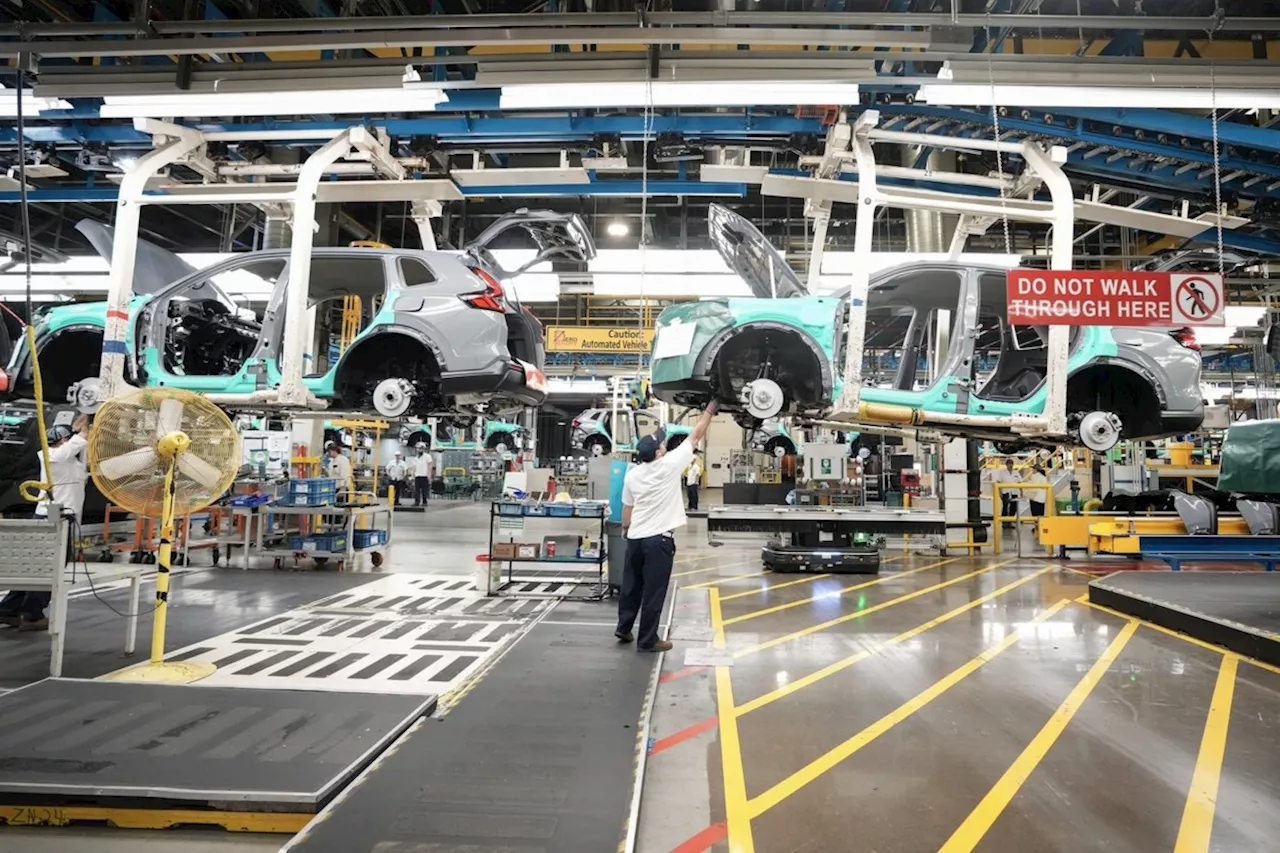 Canadian Automakers Demand End to EV Mandates Amid Incentive Program Halt and Charging Infrastructure ConcernsAutomakers in Canada are pushing back against government-mandated EV sales targets, citing the sudden end of federal EV incentives and the slow rollout of charging infrastructure.
Canadian Automakers Demand End to EV Mandates Amid Incentive Program Halt and Charging Infrastructure ConcernsAutomakers in Canada are pushing back against government-mandated EV sales targets, citing the sudden end of federal EV incentives and the slow rollout of charging infrastructure.
Read more »
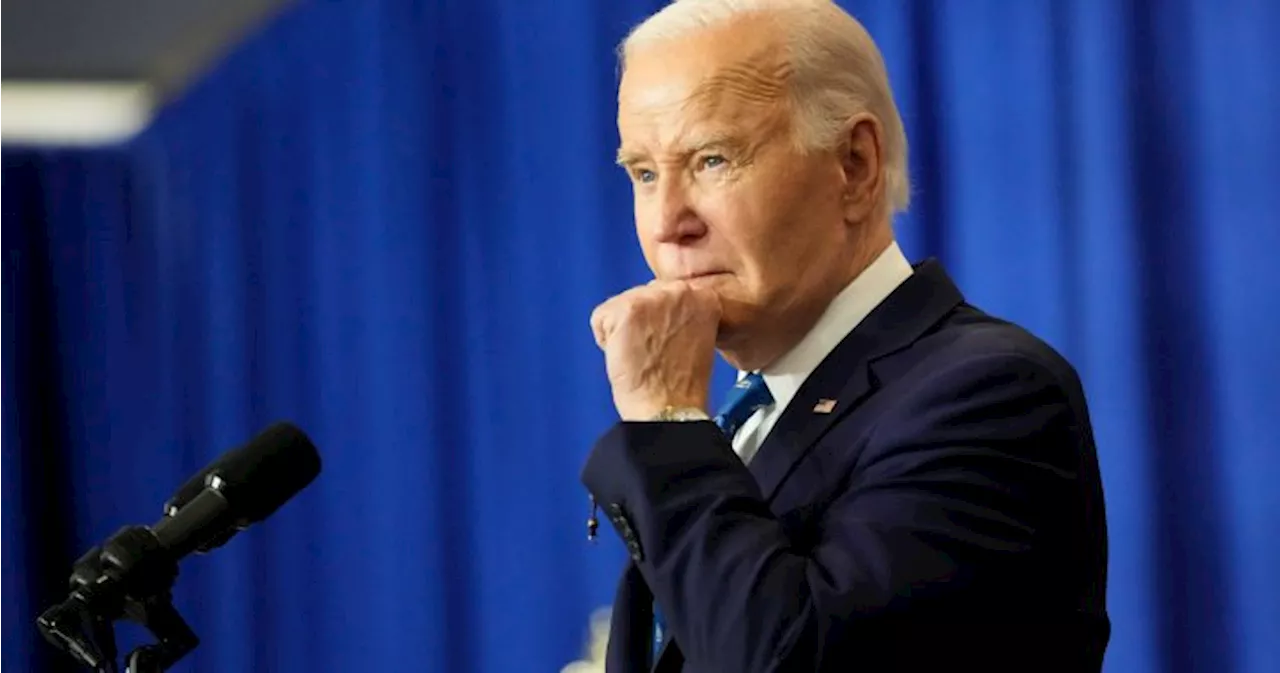 U.S. to ‘continue surging’ Ukraine aid ahead of Trump taking officeThe package includes $1.25 billion in presidential drawdown authority, which allows the military to pull existing stock from its shelves and gets weapons to the battlefield faster.
U.S. to ‘continue surging’ Ukraine aid ahead of Trump taking officeThe package includes $1.25 billion in presidential drawdown authority, which allows the military to pull existing stock from its shelves and gets weapons to the battlefield faster.
Read more »
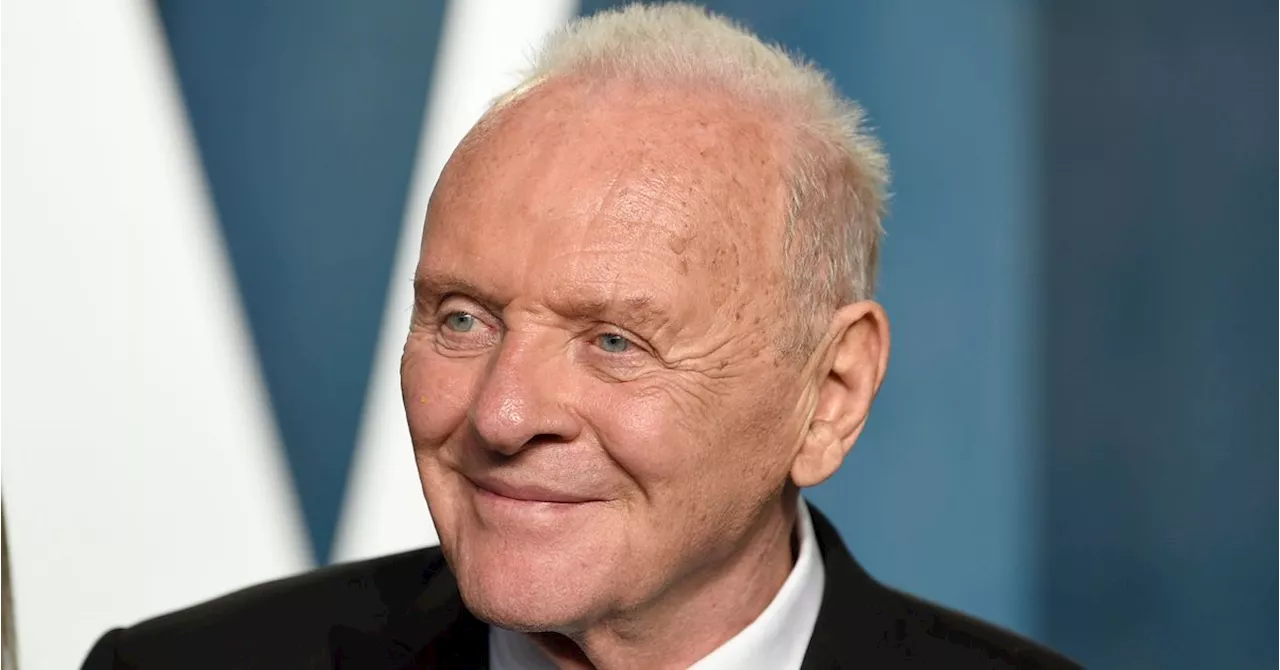 Anthony Hopkins Reflects On 49 Years Of Sobriety Ahead Of 87th Birthday: 'Life Is In Session'Ben Blanchet is a reporter based in New York City. His work has been featured in the New York Post, Insider and The Buffalo News' Sun newspapers. He was born and educated in Upstate New York.
Anthony Hopkins Reflects On 49 Years Of Sobriety Ahead Of 87th Birthday: 'Life Is In Session'Ben Blanchet is a reporter based in New York City. His work has been featured in the New York Post, Insider and The Buffalo News' Sun newspapers. He was born and educated in Upstate New York.
Read more »
 Elon Musk causes uproar for backing Germany’s far-right party ahead of electionsMusk's guest opinion piece published in German over the weekend was the second time this month he supported the Alternative for Germany, or AfD.
Elon Musk causes uproar for backing Germany’s far-right party ahead of electionsMusk's guest opinion piece published in German over the weekend was the second time this month he supported the Alternative for Germany, or AfD.
Read more »
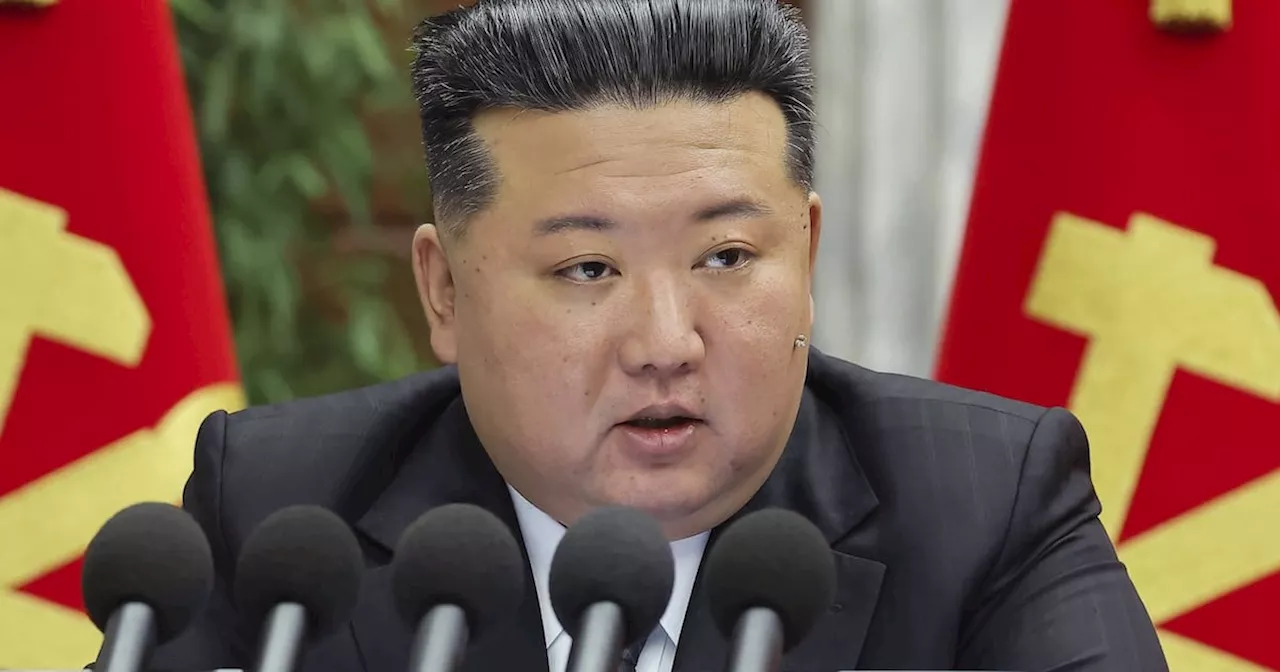 Kim Jong Un Vows 'Toughest' Anti-US Policy Ahead of Trump's ReturnNorth Korean leader Kim Jong Un has declared his intention to implement the strictest anti-US policy, in anticipation of Donald Trump's return to the White House. This announcement comes amid concerns about heightened tensions between North Korea and the US, particularly in light of Trump's previous interactions with Kim and North Korea's support for Russia in the Ukraine war. Experts predict a slow resumption of diplomacy, with Trump likely prioritizing other global conflicts.
Kim Jong Un Vows 'Toughest' Anti-US Policy Ahead of Trump's ReturnNorth Korean leader Kim Jong Un has declared his intention to implement the strictest anti-US policy, in anticipation of Donald Trump's return to the White House. This announcement comes amid concerns about heightened tensions between North Korea and the US, particularly in light of Trump's previous interactions with Kim and North Korea's support for Russia in the Ukraine war. Experts predict a slow resumption of diplomacy, with Trump likely prioritizing other global conflicts.
Read more »
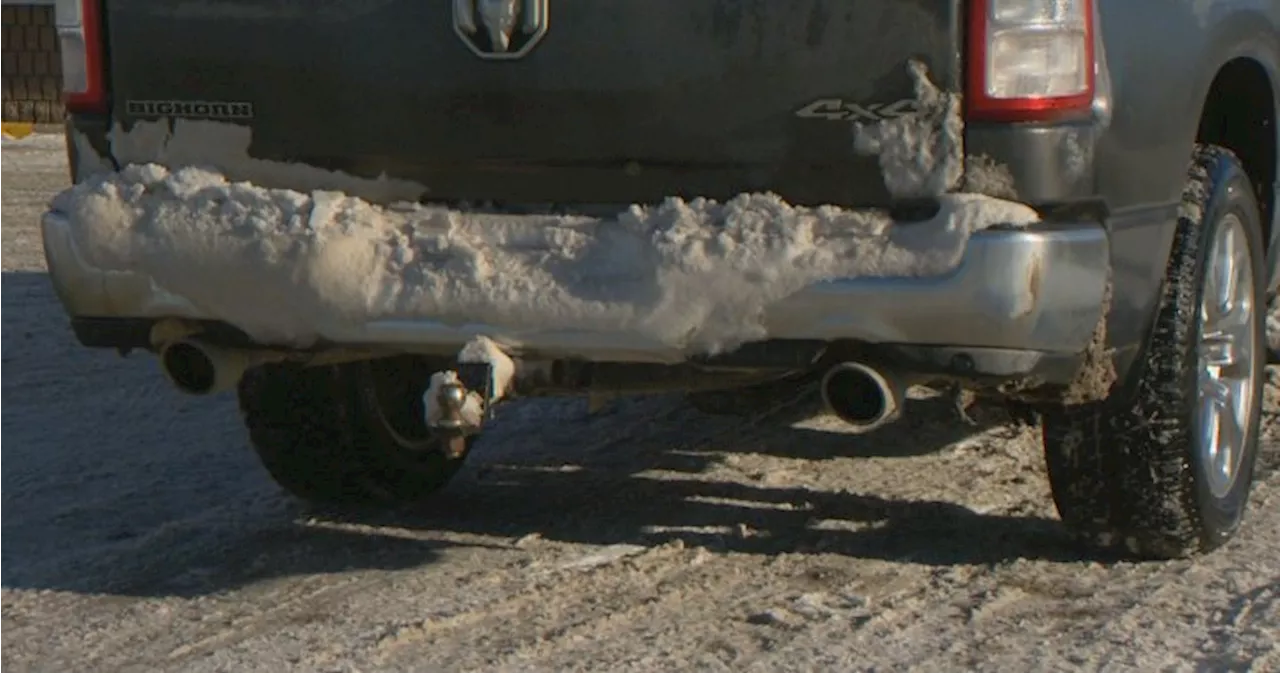 Ministry of Highways Urges Safe Travel Ahead of New Year'sThe Ministry of Highways is urging drivers to exercise caution on the roads due to potentially slippery conditions caused by frost. They advise checking road conditions through the app or website and remind drivers to slow down when passing snowplows.
Ministry of Highways Urges Safe Travel Ahead of New Year'sThe Ministry of Highways is urging drivers to exercise caution on the roads due to potentially slippery conditions caused by frost. They advise checking road conditions through the app or website and remind drivers to slow down when passing snowplows.
Read more »
